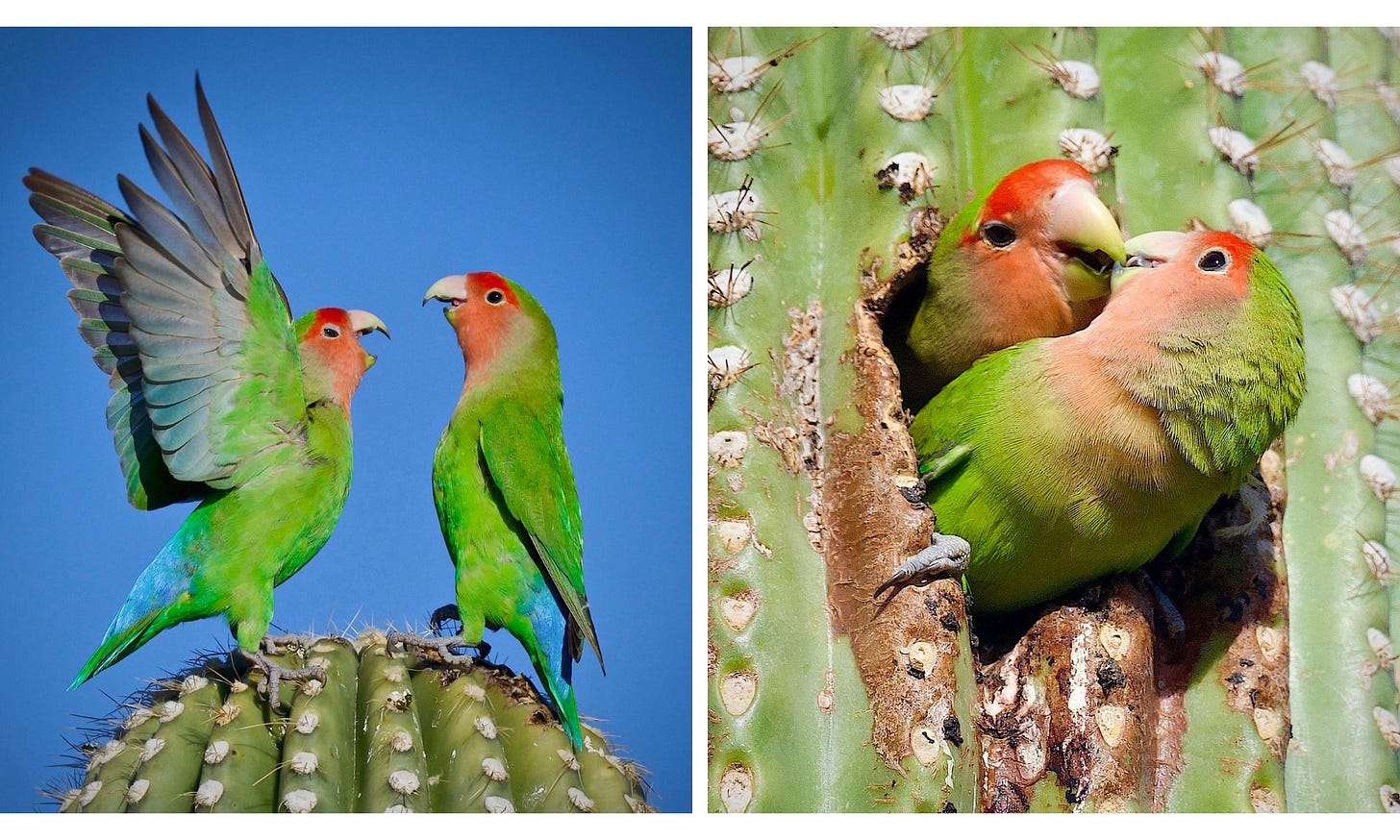My friend died of COVID-19 at 29 years of age. She left behind two children and a husband. The day she passed, I took a long somber walk with my family and noticed a flock of lovebirds in the bare, gnarled branches of a neighbor’s tree. A regionally invasive species, the rosy-faced birds stick out among our drabber Sonoran birds. On that walk, they felt like an omen, a promise.
I went home and penned a rough draft of what eventually became this poem published in Ekstasis:
Sunflowers
The day you passed
the lovebirds gathered
in the bare, gnarled branches
of the neighbor’s tree.
I stopped to listen to their
bouquet of songs, to
admire iridescent wings.
Today, I invite my child and dog
to pick flowers with blunted scissors,
but the child clips the withered grass instead
and says,
“We need this too.”
When we walk past the gnarled tree,
the flock is gone and an ache
roots deep inside me.
At home, we arrange the grass
In our crystal vase and I pretend
they are flowers anyway.
Your baby’s second birthday passed
when you were in the hospital.
A solitary cake his mother didn’t choose,
party hat lopsided, string digging into his chin.
Your milk drying up under fluorescent light
while you fought for breath.
I wake, startled, at midnight,
my own baby suckling in his sleep,
aware your passing is the unrooting
of your family,
and cannot be undone.
Tomorrow, I am going to
take those blunted scissors,
and find sunflowers,
your favorite.
It’s the least I can do
while I still have breath.
Following that experience, I became fixated with lovebirds. I’d stand for long periods underneath a neighborhood Mesquite tree or visit them at the local park where they hung out in large flocks.
I wanted to learn more about them, so I contacted an editor at an environmental journal to see if they’d commission me to write an article.
My piece published last week. Here’s an excerpt:
“Local urban legend holds that the lovebirds broke out of an overturned delivery truck bound for a pet shop, while other stories tell of a family who released their mother’s beloved parrots following her death. The truth about these regionally invasive birds is muddled somewhere in the middle; the population is most likely the product of a combination of illegal releases and escapes. Either way, they are far from their place of origin: the dry wooded countryside of southwestern Africa, which has an arid climate that, in many ways, mirrors this one, except for one important factor. Water.”
You can read the rest of the story here: https://earthisland.org/journal/index.php/articles/entry/phoenix-is-for-lovebirds
I don’t struggle with writer’s block mainly because I look at all of life as fodder for my work. Sometimes, I grow cold on a certain project and take space from it. Technically, that is “writer’s block,” but I believe it’s a sign that my brain needs to process and rest on that subject. Always, I turn my attention elsewhere. A poem. A personal essay. A new story pitch to an editor. I never run out of ideas because all of life brims with possibility. Every circumstance holds a story. Framing life in this way will free you from writer’s block.
For me, the lovebirds were a season when I fixated on a subject. I dove deep into studying them, only to surface again and know that I would not spend the rest of my life researching and penning poetry centered around parrots. But for that season, I am glad that I did.
What about you? Do you fixate on a subject or a theme for a season? Share with me in the comments—I’d love to know.
Whatever you’re working on, I wish you long, fruitful days free of writer’s block.








Wonderful words, great advice, and such a powerful poem! Thank you for all of those things.
your articles (here, and the commissioned one) are both lovely, Kris. i am so deeply sorry for the loss that spurred writing about these birds, but awed by your resolve to look up and out (and to keep doing so). conservation efforts take time, but perhaps in your willingness to notice, you, too, are playing a first and integral part in bringing those waters home. <3